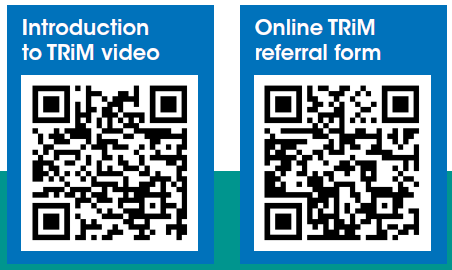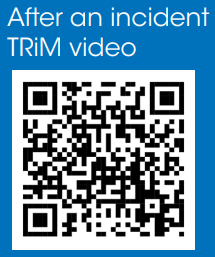TRiM Leaflet
Use the download link to access the TRiM Leaflet with further information and ways to refer.
Is it confidential?
A TRiM conversation is entirely confidential between you and the TRiM Practitioner/Manager. Information is not shared further unless we have made a shared plan for signposting or information sharing.
We all have a duty to escalate when there are safeguarding concerns. We will make a plan together on what action to take/where information needs to be shared if you share a safeguarding issue.
What if one of us turns up late? What should we do?
We can reschedule if it’s over 10 minutes
What if we think TRiM is not proving useful?
We can discuss signposting to a more appropriate source of support. If unsure we can figure this out together.
Where is my information kept?
Your information is confidential and is only available through an NSFT Sharepoint accessed by TRiM Managers only. It is not held on Lorenzo, IAPTUS or anywhere else.
What data is reported and where to?
Data reporting is 3-6months available to the Integrated Care Board and the Primary Care Networks. Ensuring that you feel psychologically safe to access support and maintaining your anonymity is EXTREMELY important to us, therefore thematic findings are reported broadly based on geographic neighbourhood localities (OneNorwich, North, South, West and Coastal).
Specific incidents are not reported, and TRiM is not part of any investigatory or risk analysis process.


We recognise that trauma is individual therefore refers to an event/incident which is impacting upon your life and ability to work in a negative way.
Some incidents may include, but are not limited to:
• An unexpected/emergency event
• A significant/serious or never event
• Receiving/witnessing challenging or abusive behaviour
• An allegation/complaint
• An untoward event
• An event whereby there is actual/threatened injury or violence
• A repeated or extreme direct or indirect exposure to adverse details of events in the course of professional duties (wounding of a thousand stories)
• A shocking/unexpected diagnosis or information
• Exposure to sensitive/difficult information regarding a friend or relative within your work role capacity
• An event which involves a difficult diagnosis/outcome for those considered to be within a vulnerable group (such as children, elderly people, pregnant women/people, people considered to have a disability or another vulnerability).
Referral form link – https://forms.office.com/r/zgRNLCY92H
• A NICE compliant model of active monitoring and support for staff following a potential traumatic event.
• A supportive and confidential conversation with a trained professional who will support you in a safe space to explore the impact (if any) of the event on your life and work.
• A supportive and confidential conversation with a trained professional who is able to recognise signs of acute and chronic traumatic stress.
• A conversation whereby psychoeducation can be offered and suggestions can be made to help improve/alleviate symptoms of trauma response
• A safe space to reflect and consider what actions you may like to take to advocate for yourself or seek further support.
• A conversation with a profession where you will be actively listened to.
• A conversation with a professional where we can support referral for additional help where indicated.
What TRiM is not:
• Aimed to be a cure and is not mandatory
• Counselling
• A form of risk management
• A form of investigation
• A form of performance assessment
• A form of Occupational Health
• A means of coaching/support for day to day life and work stressors
• An external means of assessment for reasonable adjustments
• An extension of line management
If you would like to self-refer or if you are unsure please do not hesitate to contact via:
PCNTRIM@NSFT.nhs.uk
If you have received TRiM support please share your anonymous feedback with us here: https://forms.microsoft.com/r/DMWFMpHDNA
If you decided not to accept TRiM support please tell us why (anonymously) here: https://forms.microsoft.com/r/pzF5eqgXcF
If you would like a TRiM practitioner to visit you or your team please send us a message: PCNTRIM@nsft.nhs.uk
Below is some feedback received;
“It was very useful to have access to professional support following the incident. Although we support each other well in the team, talking to someone independent of the team helped to get a better perspective.”
“The support I received from TRiM has been amazing and I am very grateful. It is an amazing Service to have. Thank you.”
“I only had an initial assessment before being referred on for additional support. Kayleigh was really easy to talk to and I felt I was in a safe place to share my experiences and concerns. Thank you.”
|
|

Sign up to the wecaretogether Primary Care Health and Wellbeing website today to create your own profile, save resources and get notifications of new resources
Sign upTo safeguard our users and comments or reviews will be anonymous and will be reviewed before being published.
There are no reviews yet. Be the first one to write one.
Sign up to the #wecaretogether Primary Care Health and Wellbeing website today so you can save favourites and be notified when new resources are available.
